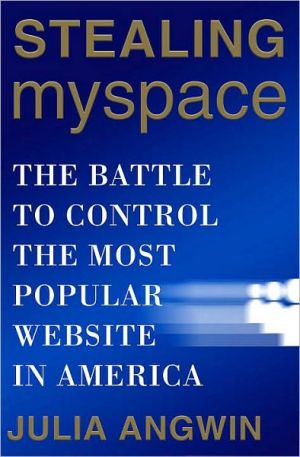
Stealing MySpace: The Battle to Control the Most Popular Website in America PDF
Preview Stealing MySpace: The Battle to Control the Most Popular Website in America
A few years ago, MySpace.com was just an idea kicking around a Southern California spam mill. Scroll down to the present day and MySpace is one of the most visited Internet destinations in America, displaying more than 40 billion webpage views per month and generating nearly $1 billion annually for Rupert Murdoch’s online empire. Even by the standards of the Internet age, the MySpace saga is an astounding growth story, which climaxed with the site’s acquisition by Murdoch’s News Corporation in 2005 for a sum approaching one billion dollars. But more than that, it may be the defining drama of the digital era.
In Stealing MySpace, Pulitzer Prize-winning journalist Julia Angwin chronicles the rise of this Internet powerhouse. With an unerring eye, Angwin details how MySpace took the Internet by storm by grabbing the best ideas from around the Web, encouraging pinup stars such as Tila Tequila to make their home on its pages and giving everyone freedom to experiment with online identities–including using somebody else’s identity.
Stealing MySpace introduces us to the site’s founders, Chris DeWolfe and Tom Anderson, who dabbled in computer hacking, online pornography, spam, and spyware before starting MySpace. Although their street savvy, doggedness, and clubbing skills far eclipsed their tech prowess, they stumbled their way to success and soon found themselves at ground zero of a high-stakes war that pitted Rupert Murdoch against his frequent nemesis, the combative Viacom CEO Sumner Redstone. Angwin sheds light on the dizzying backroom deals that allowed Murdoch to snatch MySpace from Viacom’s grasp even as the MySpace founders remained in the dark about their own fate. Then she takes us inside the Murdoch empire as DeWolfe and Anderson lobby furiously to regain control of their creation.
Venturing beyond the business aspects of the story, Angwin also explores the Internet culture, a voyeuristic world in which MySpace must stay one step ahead of amateur pornographers, sexual predators, and “spoofers” who set up fake profiles (Rupert Murdoch himself tolerates dozens of phony “Ruperts” on the site) and cope with the general excesses and sometimes illegal acts of a community of account holders equal in number to the population of Japan.
In Stealing MySpace, Julia Angwin dishes on the epic real-world battle for control of a virtual empire. In a savvy, smart, fast-paced narrative reminiscent of Bryan Burrough and John Helyar’s Barbarians at the Gate and Michael Lewis’s The New New Thing, Stealing MySpace tells is the whole gripping story behind a breakout cultural phenomenon.
From the Hardcover edition.
**
Amazon.com ReviewBook Description
A few years ago, MySpace.com was just an idea kicking around a Southern California spam mill. Scroll down to the present day and MySpace is one of the most visited Internet destinations in America, displaying more than 40 billion webpage views per month and generating nearly $1 billion annually for Rupert Murdoch’s online empire. Even by the standards of the Internet age, the MySpace saga is an astounding growth story, which climaxed with the site’s acquisition by Murdoch’s News Corporation in 2005 for a sum approaching one billion dollars. But more than that, it may be the defining drama of the digital era.
In Stealing MySpace, Pulitzer Prize-winning journalist Julia Angwin chronicles the rise of this Internet powerhouse. With an unerring eye, Angwin details how MySpace took the Internet by storm by grabbing the best ideas from around the Web, encouraging pinup stars such as Tila Tequila to make their home on its pages and giving everyone freedom to experiment with online identities–including using somebody else’s identity.
Stealing MySpace introduces us to the site’s founders, Chris DeWolfe and Tom Anderson, who dabbled in computer hacking, online pornography, spam, and spyware before starting MySpace. Although their street savvy, doggedness, and clubbing skills far eclipsed their tech prowess, they stumbled their way to success and soon found themselves at ground zero of a high-stakes war that pitted Rupert Murdoch against his frequent nemesis, the combative Viacom CEO Sumner Redstone. Angwin sheds light on the dizzying backroom deals that allowed Murdoch to snatch MySpace from Viacom’s grasp even as the MySpace founders remained in the dark about their own fate. Then she takes us inside the Murdoch empire as DeWolfe and Anderson lobby furiously to regain control of their creation.
Venturing beyond the business aspects of the story, Angwin also explores the Internet culture, a voyeuristic world in which MySpace must stay one step ahead of amateur pornographers, sexual predators, and “spoofers” who set up fake profiles (Rupert Murdoch himself tolerates dozens of phony “Ruperts” on the site) and cope with the general excesses and sometimes illegal acts of a community of account holders equal in number to the population of Japan.
In Stealing MySpace, Julia Angwin dishes on the epic real-world battle for control of a virtual empire. In a savvy, smart, fast-paced narrative reminiscent of Bryan Burrough and John Helyar’s Barbarians at the Gate and Michael Lewis’s The New New Thing, Stealing MySpace tells is the whole gripping story behind a breakout cultural phenomenon.
Julia Angwin on *Stealing MySpace*
Porn. Hacking. Spyware. Spam. Spy cameras you can hide in your shoe.
Prior to launching MySpace, the founders dabbled in all of the above. Relentless marketers and knockoff artists, their story also included a boardroom coup, broken friendships, betrayals, litigation and a pair of feuding media moguls--Sumner Redstone and Rupert Murdoch.
